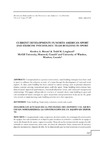Identificador persistente para citar o vincular este elemento:
https://accedacris.ulpgc.es/jspui/handle/10553/7849
| Campo DC | Valor | idioma |
|---|---|---|
| dc.contributor.author | Bloom, Gordon A. | en_US |
| dc.contributor.author | Loughead, Todd M. | en_US |
| dc.date.accessioned | 2012-08-11T04:01:01Z | - |
| dc.date.accessioned | 2018-03-08T13:20:07Z | - |
| dc.date.available | 2012-08-11T04:01:01Z | - |
| dc.date.available | 2018-03-08T13:20:07Z | - |
| dc.date.issued | 2011 | en_US |
| dc.identifier.issn | 1886-8576 | en_US |
| dc.identifier.uri | https://accedacris.ulpgc.es/handle/10553/7849 | - |
| dc.description.abstract | Conceptualized as a process intervention, team building strategies have been used in sport to enhance the cohesion or unity of a team through the development of task and social aspects. To date, team building has been utilized in various settings such as physical education classes, exercise settings, recreational sport, and elite sport. Team building interventions have demonstrated improved performance, increased adherence levels, and enhanced interpersonal relationships. This paper will provide an overview of research about team building in sport and will recommend future strategies to sport researchers and practitioners from across the globe who intend on implementing team building activities into their repertoire. | en_US |
| dc.format | application/pdf | es |
| dc.language | eng | en_US |
| dc.relation.ispartof | Revista Iberoamericana de Psicologia del Ejercicio y el Deporte | en_US |
| dc.source | Revista Iberoamericana de Psicología del Ejercicio y el Deporte. Sevilla : Wanceulen, 2006 [ISSN 1886-8576], 2011, v. 6 (2) p. 237-249 | en_US |
| dc.subject | 61 Psicología | en_US |
| dc.subject.other | Team building | en_US |
| dc.subject.other | Team unity | en_US |
| dc.subject.other | Cohesion | en_US |
| dc.subject.other | Social | en_US |
| dc.subject.other | Task | en_US |
| dc.subject.other | Coach | en_US |
| dc.title | Current developments in North American sport and exercise psychology: team building in sport | en_US |
| dc.type | info:eu-repo/semantics/article | en_US |
| dc.type | Article | en_US |
| dc.compliance.driver | 1 | es |
| dc.identifier.absysnet | 537108 | es |
| dc.identifier.crisid | -;- | - |
| dc.investigacion | Artes y Humanidades | en_US |
| dc.rights.accessrights | info:eu-repo/semantics/openAccess | es |
| dc.type2 | Artículo | en_US |
| dc.identifier.ulpgc | Sí | es |
| dc.description.sellofecyt | Sello FECYT | |
| dc.description.esci | ESCI | |
| dc.description.erihplus | ERIH PLUS | |
| item.grantfulltext | open | - |
| item.fulltext | Con texto completo | - |
| Colección: | Rev. Iberoam. psicol. ejerc. deporte. 2011. v.6, n.2 Artículos | |
Visitas 5
182
actualizado el 11-ene-2026
Descargas
247
actualizado el 11-ene-2026
Google ScholarTM
Verifica
Comparte
Exporta metadatos
Los elementos en ULPGC accedaCRIS están protegidos por derechos de autor con todos los derechos reservados, a menos que se indique lo contrario.
